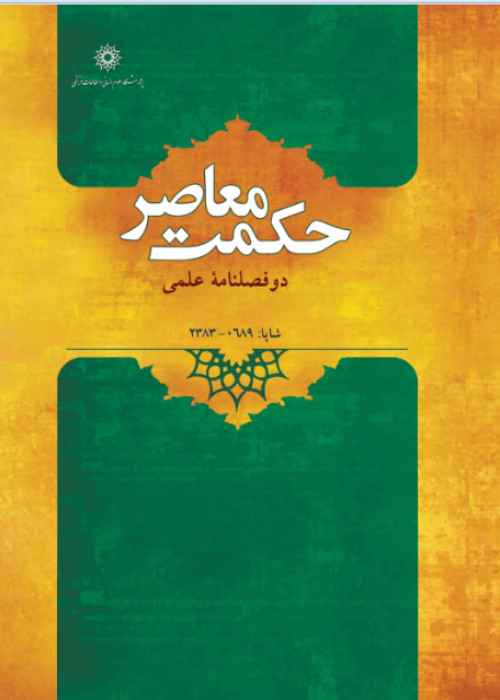A Study of Mahdi Elahi Ghomshei’s Thesis of the Necessary Existent’s Agency by Love: Theoretical Foundations in the Works of Earlier Muslim Philosophers
Author(s):
Article Type:
Research/Original Article (دارای رتبه معتبر)
Abstract:
Introduction
Muslim theologians and philosophers debate the manner in which the world was created by God. Theologians assert that God’s role in creation is characterized in terms of agency-by-intention (fāʿiliyya bi-l-qaṣd), while Peripatetic philosophers argue for agency-by-providence (fāʿiliyya bi-l-ʿināya), and Illuminationist (Ishrāqī) philosophers propose agency-by-agreement (fāʿiliyya bi-l-riḍā). Mullā Ṣadrā and his adherents advocate for agency-by-providence, where their definition of this kind of agency closely aligns with the concept of agency-by-manifestation (fāʿiliyya bi-l-tajallī) as suggested by Muslim mystics. Twentieth-century Muslim philosopher Mahdi Elahi Ghomshei introduced another form of agency, which he calls agency-by-love (fāʿiliyya bi-l-ʿishq). He posits that the primary impetus behind the creation of the world by the necessary existent is His love and delight for His own essence, serving as the source from which all things emanate. Elahi Ghomshei pioneered this concept to explain God’s agency. The central question of this study is whether this concept has precedent in the works of earlier Muslim philosophers and, if so, how it was addressed within those works.Research
Methodology
This research employs the analytic-descriptive method by examining library sources. Initially, we investigate the perspectives of the scholars concerning the agency of the necessary existent, and subsequently, we draw our conclusions.Discussion and
Results
An examination of the writings of philosophers and intellectuals predating Elahi Ghomshei reveals that they did not neglect the significance of love in God’s agency. Indeed, dating back to Plato and Aristotle, the role of love in the agency of the necessary existent has been consistently emphasized. Furthermore, certain philosophers contended that the creation of the world without love is inconceivable. However, instead of employing the term "agency by love," they utilized alternative expressions such as attraction force, natural magnetism, love-based motion, and others, as will be elucidated below.Plato and Aristotle delved into the concept of the love of the demiurge—the creator of the world—or the unmoving mover for its own essence, highlighting its significance in imparting order and motion to worldly affairs. Among thinkers, Muslim philosophers and mystics stand out for their emphasis on God''s love and delight in His essence. Al-Fārābī offers a nuanced definition of love and delight, positing that the love of the necessary existent for its essence represents the pinnacle of love. He contends that God possesses the utmost perception, directed at the highest perceivable entity—His own essence. Thus, in the realm of the divine, the distinction between lover and beloved collapses, as they are one and the same.
Avicenna contends that the ultimate form of delight is found in the necessary existent''s delight in its own essence. This arises from its perfect perception of all beings, making it impervious to the realm of possibility and nonexistence. Avicenna posits that God is loved for His essence and is the object of love for all beings, suggesting that their very existence is sustained through their love for God. Shaykh al-Ishrāq Suhrawardī and Ṣadr al-Mutaʾallihīn also emphasize God''s profound inherent love for His essence, depicting Him as the most delighted being by its essence, and asserting that this fundamental love and delight are the primary impetuses behind the creation of the world.
Ibn al-ʿArabī asserts that all motion in this world, culminating in the existence of the universe, emanates from love—primarily the love possessed by God and also by other beings and natural causes through divine love. Without such affection, the world would remain unmanifest. Similarly, Imam Khomeini contends that divine love serves as the guiding and directing force in both the natural and supernatural realms (Imam Khomeini 1989, 76). He argues that existence and the sustenance of existence stem from essential love, which acts as both the existence-conferring and sustaining causes of beings. Referring to these two realms as the facilitators of creation and the pathways to perfection, he emphasizes that without this love, no entity could come into being, and no individual or object could attain perfection; thus, the heavens themselves are erected by love.
Conclusion
We conclude that although Mahdi Elahi Ghomshei was the first philosopher to employ the term "agency-by-love" to explain the agency of the necessary existent, discussions regarding God''s love for His own essence trace back to ancient times. Plato, Aristotle, and several other ancient Greek philosophers explored the notion of the creator''s love for its essence. In the Islamic world, mystics, philosophers, and theologians engaged with and endeavored to explain the notion of God''s agency within their respective frameworks. While they present various explanations for God''s agency—such as agency-by-intention, agency-by-providence, agency-by-agreement, or agency-by-manifestation—they unanimously affirm God''s possession of agency-by-love. These philosophers argue that perception is the source of love, with the intensity of love corresponding to the brilliance and beauty of the perceived entity. As God''s essence epitomizes beauty and brilliance, and He is both the perceiver and the perceived by His essence, He possesses the utmost love and delight for His essence.Keywords:
agent , Creation , Love , Elahi Ghomshei , perception
Language:
Persian
Published:
Journal of Hekmat e Mo'aser, Volume:14 Issue: 37, 2024
Pages:
139 to 163
https://magiran.com/p2693395
دانلود و مطالعه متن این مقاله با یکی از روشهای زیر امکان پذیر است:
اشتراک شخصی
با عضویت و پرداخت آنلاین حق اشتراک یکساله به مبلغ 1,390,000ريال میتوانید 70 عنوان مطلب دانلود کنید!
اشتراک سازمانی
به کتابخانه دانشگاه یا محل کار خود پیشنهاد کنید تا اشتراک سازمانی این پایگاه را برای دسترسی نامحدود همه کاربران به متن مطالب تهیه نمایند!
توجه!
- حق عضویت دریافتی صرف حمایت از نشریات عضو و نگهداری، تکمیل و توسعه مگیران میشود.
- پرداخت حق اشتراک و دانلود مقالات اجازه بازنشر آن در سایر رسانههای چاپی و دیجیتال را به کاربر نمیدهد.
In order to view content subscription is required
Personal subscription
Subscribe magiran.com for 70 € euros via PayPal and download 70 articles during a year.
Organization subscription
Please contact us to subscribe your university or library for unlimited access!



